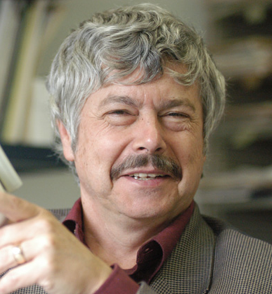
Two researchers, John Seinfeld, PhD, and Kirk R. Smith, MPH, PhD, whose groundbreaking work revealed the dangers of air pollution, have been awarded the 2012 Tyler Prize for Environmental Achievement. They will also share the prize's $200,000 award.
"Professors Smith and Seinfeld are giants in the efforts to understand and reduce the devastating impacts of air pollution," said Tyler Prize Executive Committee Chair Owen T. Lind, Professor of Biology at Baylor University.
Creating a mathematical model of the atmosphere
John Seinfeld, a professor of chemical engineering at Caltech, joins a distinguished list of Tyler laureates from Caltech, including air quality research pioneer Arie Haagen-Smit, who discovered the source of photochemical smog.

Originally trained in chemical engineering, Seinfeld was quickly captivated by the chemistry of air pollution after moving to Los Angeles in the late 1960s. "It became very clear to me that the atmosphere is really just a big chemical reactor and that was fascinating, so I changed my research direction to try to understand this reactor within which we live," recalled Seinfeld.
"When I began doing research on the atmosphere, I read Haagen-Smit's early papers and got to know him," Seinfeld says. "I never would have imagined at that time that the work I would do someday would lead to my recognition with the same prize that Haagen-Smit received for his work."
Early in his research, Seinfeld realized that in order to make progress in terms of controlling smog, a comprehensive model of the atmosphere was needed. In the early 1970s, he created a mathematical model of the Los Angeles atmosphere - the first model ever created of an urban atmosphere.
Seinfeld's research on the complicated interactions between pollutants, and the new molecules they produce, helped to launch an entirely new field of research on organic aerosols that continues to expand today. The Clean Air Act now requires states to use similar models to guide their planning for air-pollution control.
Finding a killer in developing world kitchens
Kirk R. Smith of UC Berkeley was the first to identify the harm caused by smoke from the burning of fuels like

wood or dung in homes in the developing world in 1981. For the last 30 years, Smith's research has focused on measuring the damage it does to people's health and looking for solutions.
"Most people recognize that smoking is the worst thing you can do for your health," explained Smith. "The next worst thing you can do is be around smoke, and indoor fires are like being around a thousand burning cigarettes per hour. Babies may not smoke, but they are in these homes."
Recognizing the harm this does to the health of individuals, especially women and children, Smith's research has also identified the scale of the problem.
"We now understand that the deadly effects of these fuels that are used by nearly half the world," said Smith. "The impact of household air pollution is on scale with any other major health risk in developing countries, including exposure to HIV, mosquitoes or dirty water."
The Tyler Prize
The Tyler Prize is one of the first international premier awards for environmental science, environmental health and energy. Established in 1973, the Tyler prize has been awarded to 61 individuals and four organizations for environmental accomplishments.
Previous laureates include Edward O. Wilson, recognized for his early work on the theory of island biogeography; Jane Goodall, selected for her seminal studies on the behavior and ecology of chimpanzees and her impact on wildlife awareness and environmental conservation; Jared Diamond, a renowned author who gave birth to the discipline of conservation biology; and Thomas Lovejoy, a central figure in alerting the world to the critical problem of dwindling tropical forests.


